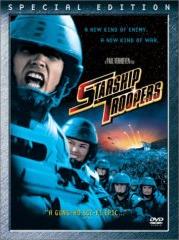
I will first review Starship Troopers directed by Paul Verhoeven as a movie, then compare how it stands up against the novel of the same name by Robert A. Heinlein. The Hollywood movie opens up with some political propaganda films trying to get the public to join the Mobile Infantry, saying “Service guarantees citizenship.” Various soldiers are shown saying “I’m doing my part!” then the camera zooms in on a little kid in uniform saying “I’m doing my part too!” The only way to earn the right to vote and become a full citizen is to join the military for a term of service.
The movie’s premise is that Earth is under attack by aliens from Klendathu. This is described through a series of TV style news clips. The “Bugs,” or “Arachnids,” are hurling meteors at Earth, which have been intercepted for the most part by the space Navy. The obvious solution to Earth’s survival is the extermination of the aliens. The scene jumps to some news coverage on the Arachnid home world of Klendathu during a huge battle. (more…)